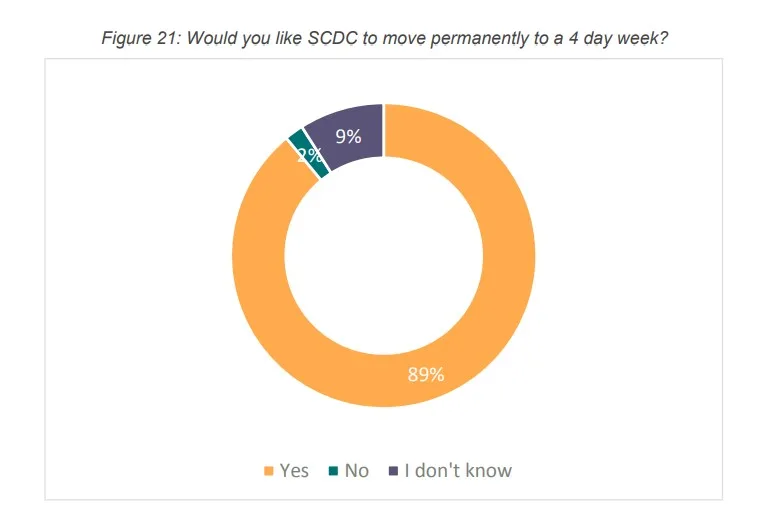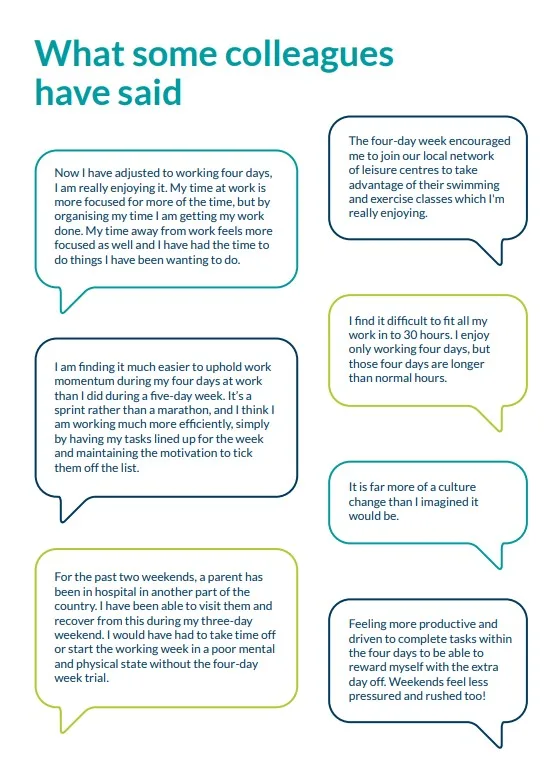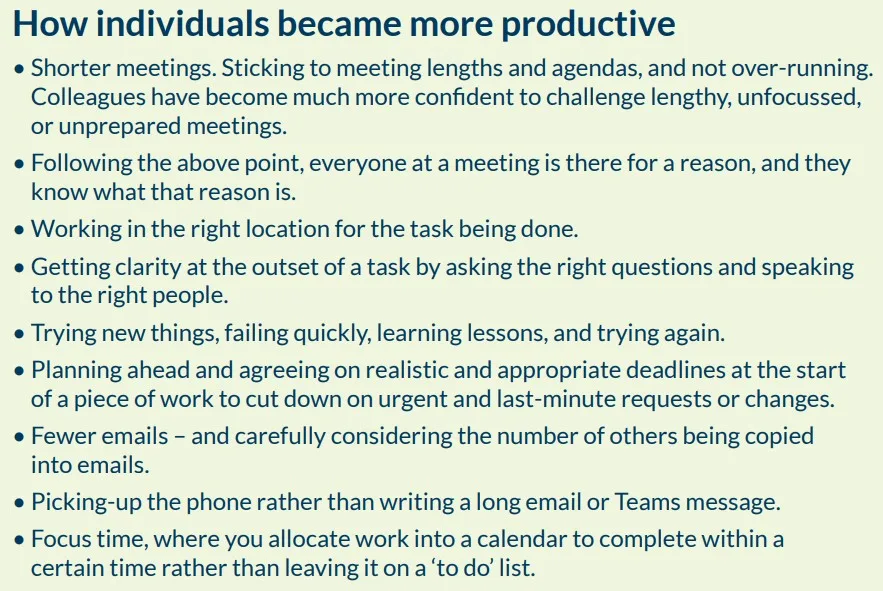A 12-month extension of its four-day week trial is to be considered by South Cambridgeshire District Council.
Chief executive Liz Watts says “the council undertook a three-month trial of a four-day week (4DW) for all desk-based colleagues between January and March 2023.
“Overall, the trial was deemed to be a success and an extension of a further year is recommended, to test whether a 4DW can positively impact recruitment and retention issues faced by the council”.
She says recruitment – especially of planning officers – is one area in which the council has seen “a noticeable improvement” since the trial was announced.
Ms Watts stopped just short of advising that the better performance could be definitively attributable to the trial.

“It is noticeable that during the trial we have had success in recruiting into previously hard to fill posts, particularly in the shared planning service,” she says.
“During the trial, we have seen an increase in the number of applications received per post; on average we have had 4.8 applications per post, compared with 3.4 in the same period last year.
“These candidates have also been of a higher standard, and we have been able to successfully appoint to roles we have previously been unable to.”
LETTER: Here’s the real reason Fenland Council planning hit crisis point
For example, she says, the council advertised a planning officer post last summer and received only 1 applicant, who was not suitable for the role.
“We have recently readvertised and received 9 strong applications with 5 selected for interview all of whom are potentially appointable,” says Ms Watts.
“We have only been unable to appoint and had to readvertise 1 post during the trial, compared to 6 posts in the same period last year.
‘Good candidates’
“The applications have generally been deemed good candidates.”
Cabinet will now discuss an extension of the desk-based trial for a further year “to allow the council to fully understand the implications of the 4DW on the recruitment and retention of staff”.
A 3-month trial for those in the waste shared service is also being considered.
“The trial has potential to deliver savings for the council,” says the chief executive.
A report to the employment and staffing committee will be asked to recommend Cabinet agrees the extension of the trial to March 2024.
The recommendations include “ensure equivalent reporting arrangements are established in order to provide Cambridge City Council with appropriate oversight arrangements regarding the shared planning service”.
Fenland Council faces planning crisis after split from Peterborough
The chief executive says the council’s success depends on its people. Recruitment and retention challenges facing councils (and the private sector) across the country are well known.
“South Cambridgeshire District Council has suffered from significant recruitment issues (particularly in some areas of the council’s services),” she will tell the committee.
The most recent retention and turnover report to the committee noted that in the three quarters up to December 2022, the number of vacancies that the council successfully filled was less than 60%.
She reminds members that recruitment costs are not limited to advertising and going through the recruitment process.
Costs of recruitment
When taking into account the time spent inducting/training new employees to reach a level of full productivity in the role, estimates by Oxford Economics are that filling a role costs on average £30,614 “making the case for addressing the recruitment challenge very clearly”.
In August 2022, a total of 23 agency staff were employed to cover vacancies at a 12-month cost of £2,065.000.
The wage bill for permanent employees in the same roles would have been approximately 50% less, resulting in potential savings of close to £1,000,000 if the 4-day week improved recruitment to the extent that these roles could be replaced by permanent employees.
Ms Watts says the recent trial was not expected to address recruitment and retention issues (as the time frame was too short) but was designed to see whether performance could be maintained and whether health and wellbeing improved.
“If both outcomes were positive, this would indicate that a longer trial could be considered viable, at which point recruitment and retention could be properly measured,” she says.
She feels the 4DW can increase value for money, improve productivity, and budget savings.
The council will hear that while a 4DW in its ‘purest’ form expects hours to reduce to 80%, several companies in private sector trials have adopted different approaches, following their trials. Some have reduced hours but not by the whole 20%.
Plans for waste trial
The waste trial is anticipating a reduction of hours by 16.5% (to 32 hours over four days).
Councillors will consider some “very broad conclusions” from the initial survey of the trial.
1: Females seem to benefit more from the 4DW than males. This may be related to caring responsibilities (and having more time to undertake them).

The scores for those who claim to have childcare or caring responsibilities have improved dramatically at all levels.
2: Also, older employees (50+) benefit over-proportionally from the 4DW, especially in terms of mental health, intention to leave (it reduces significantly), and productivity.
3: However, the 4DW seems to create one issue for younger workers (under 25) and for people who have been employed by SCDC for less than one year.
The issue is likely exacerbated by hybrid working, so not just a result of the 4DW trial.
The report also says there is a general feeling that the organisation is not using software efficiently, and that there are issues related to slow laptops and systems reducing productivity that, again, need to be analysed as part of the way forward.
Recruitment and agency staff finance implications
It is expected that improved recruitment because of the adoption of a 4-day week would be able to deliver savings by reducing the council’s reliance on agency staff.
When considering desk-based staff, a direct comparison between September 2022 and the end March 2023, shows the council currently have 19 agency staff that are covering vacancies (down from 23 in August 2022).
A 12-month extrapolation of the cost of these agency workers is £1,792,000 (down from £2,065,000 in August 2022), saving nearly £300k annually.

The chief executive offers these options to be considered by the committee:
1: Members could decide not to extend the trial, although given the positive data around performance, health & wellbeing, and potential for savings, this is not the recommended option.
- Members could move to become a permanent 4DW employer without an extended trial.
This would risk making assumptions about recruitment and retention without any robust data and is therefore not the recommended option.
Financial
The trial so far, and the proposed extended trial, will incur no additional cost.
It is anticipated that savings will be delivered through reducing agency staff further and reducing the need to spend time and resources on recruitment.
Legal
Neither the trial, nor the proposed extension, require any changes to employee terms and conditions as participation will be on a voluntary basis.
Staffing
There is a risk of associated impacts, including on service delivery, reputational damage, increased staff sickness and increased expenditure associated with reliance on contractors.
The 4DW trial is listed as a control measure for this risk, due to the potential for a successful trial to assist with attracting staff to the council, and to contribute to the wellbeing and satisfaction of existing staff, thereby reducing turnover.
The chief executive feels the trial has shown that it is possible to provide a significant benefit to employees without jeopardising performance.
“The very positive feedback in the health and wellbeing survey demonstrates that colleagues believe the Council has demonstrated itself to be an exceptional employer,” she adds.
Joe Ryle, the director of the 4 Day Week Campaign, said: “South Cambridgeshire’s historic trial has been an undeniable success and it paves the way for other councils across the country to follow their lead.”

















